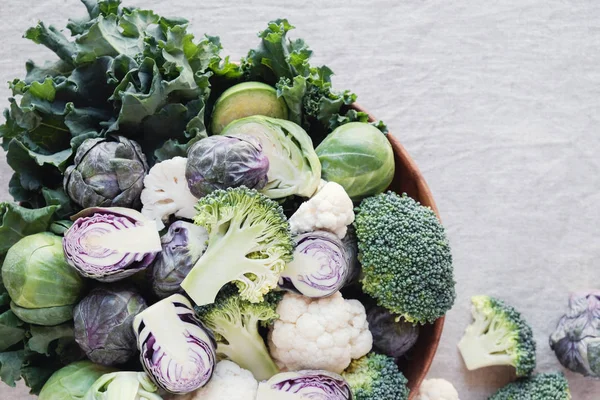Share this @internewscast.com
Discover “Why And Who Should Avoid Eating Cruciferous Vegetables?” Cruciferous vegetables are a group of nutrient-rich vegetables known for their health benefits. They are high in vitamins, minerals, fiber, and glucosinolates, which are sulfur-containing compounds responsible for their bitter taste and pungent aroma. These glucosinolates are broken down into biologically active compounds during food preparation, chewing, and digestion, and many studies have linked these compounds to various health benefits, including:
- Cancer prevention: Isothiocyanates and indoles, formed from glucosinolates, have shown potential in inhibiting cancer cell growth and promoting apoptosis (programmed cell death).
- Heart health: Cruciferous vegetables may help reduce LDL (bad) cholesterol levels and protect against heart disease.
- Detoxification: Indoles and isothiocyanates may help neutralize harmful toxins and carcinogens in the body.
- Improved immunity: Cruciferous vegetables are rich in vitamin C and other antioxidants, which boost the immune system.

Despite their numerous health benefits, there are some cases where individuals might need to limit or avoid cruciferous vegetables. Here are some specific groups:
People with hypothyroidism
Cruciferous vegetables contain goitrogens, which can interfere with iodine uptake and thyroid function. This is particularly relevant for people with existing hypothyroidism, as it can exacerbate their condition. Cooking these vegetables can reduce the goitrogenic effect, making them safer to consume in moderation.
Individuals taking blood thinners
Cruciferous vegetables are rich in vitamin K, which plays a vital role in blood clotting. For individuals taking blood-thinning medication, consuming large amounts of cruciferous vegetables may interfere with the medication’s effectiveness. Consulting with a healthcare professional is crucial to determine the appropriate level of intake.
People with irritable bowel syndrome (IBS)
Cruciferous vegetables contain FODMAPs, fermentable carbohydrates that can trigger digestive symptoms in individuals with IBS. While not everyone with IBS reacts to FODMAPs, some experience bloating, gas, and diarrhea after consuming them. A low-FODMAP diet may be recommended for managing IBS symptoms, which would involve limiting cruciferous vegetables.
Individuals with G6PD deficiency
This genetic condition affects how the body processes glucose. A compound found in cruciferous vegetables, glucosinolates, can be broken down into isothiocyanates, which can trigger oxidative stress and red blood cell breakdown in individuals with G6PD deficiency. Moderation or avoidance of cruciferous vegetables may be necessary for this group.
People with kidney stones
Cruciferous vegetables are high in oxalates, which can contribute to the formation of kidney stones in susceptible individuals. Individuals with a history of kidney stones may need to limit their intake of these vegetables or consult with their doctor for personalized advice.
Pregnant or breastfeeding women
While cruciferous vegetables offer numerous health benefits, consuming excessive amounts may expose the developing fetus or infant to goitrogens, potentially affecting thyroid function. Moderation and consulting with a healthcare professional are crucial for pregnant and breastfeeding mothers.
People with allergies or sensitivities
Some individuals may have allergies or sensitivities to specific cruciferous vegetables. Symptoms like hives, itching, and difficulty breathing can occur upon consumption. Avoiding the vegetables responsible for the reactions is necessary in such cases.
List of cruciferous vegetables
-
Broccoli
-
Brussels sprouts
-
Cabbage
-
Cauliflower
Read Related Also: Can Type 2 Diabetics Eat Grapes Everyday? Here’s What Dietitians Say
-
Kale
-
Collard greens
-
Bok choy
-
Turnips
-
Watercress
-
Arugula
-
Radishes
-
Horseradish
-
Wasabi
Alternative vegetables for people who should avoid cruciferous vegetables
Choosing alternative vegetables depends on the specific reason for avoiding cruciferous vegetables. Here are some options based on common reasons:
For people with hypothyroidism:
- Leafy greens: Spinach, romaine lettuce, and Swiss chard are good sources of essential vitamins and minerals, like vitamin K and folate. They are also low in goitrogens, making them a safe alternative to cruciferous vegetables.
- Bell peppers: Red, yellow, and orange bell peppers are rich in vitamins A and C, important for boosting the immune system and overall health.
- Celery: This crunchy vegetable is low in calories and high in water content, promoting hydration and digestion.
- Carrots: A natural source of beta-carotene, which the body converts into vitamin A. They are also high in fiber and potassium.
- Mushrooms: These versatile fungi are a good source of vitamins B, D, and potassium. They also have various health benefits, including boosting the immune system and promoting heart health.
For individuals who are pregnant or breastfeeding:
- Sweet potatoes: Packed with vitamin A and beta-carotene, crucial for fetal development. They are also a good source of fiber and potassium.
- Avocados: Rich in healthy fats, vitamins, and minerals, essential for both mother and baby’s health.
- Beets: A natural source of folate, which helps prevent neural tube defects in babies. They are also rich in iron and antioxidants.
- Artichokes: These unique vegetables are a good source of fiber, vitamins, and minerals. They also have potent antioxidant and detoxifying properties.
- Squash: Butternut squash, acorn squash, and delicata squash are naturally sweet and provide vitamins A and C, along with fiber and potassium.
For individuals with IBS or sensitive digestive systems:
- Green beans: A good source of fiber, vitamins K and C, and manganese. They are also low in FODMAPs, which can trigger digestive symptoms in individuals with IBS.
- Zucchini: This versatile vegetable is low in FODMAPs and easily digestible. It can be eaten raw, cooked, or juiced.
- Cucumbers: High in water content, promoting hydration and digestion. They are also a good source of vitamins C and K.
- Asparagus: This spring vegetable is a good source of fiber and folate. It is also low in FODMAPs and easily digestible.
- Green peas: Rich in protein, fiber, and vitamins A and C. They are also a good source of iron and folate.
For people with kidney stones:
- Spinach: A good source of vitamins A and K, but low in oxalates, minimizing the risk of kidney stones.
- Bell peppers: Low in oxalates and a good source of vitamins A and C.
- Mushrooms: Low in oxalates and rich in various health-promoting nutrients.
- Sweet potatoes: Low in oxalates and a good source of beta-carotene, fiber, and potassium.
- Green beans: Low in oxalates and a good source of fiber, vitamins K and C, and manganese.
For people with G6PD deficiency:
- Leafy greens: Low in glucosinolates and a good source of essential vitamins and minerals.
- Bell peppers: Low in glucosinolates and rich in vitamins A and C.
- Celery: Low in glucosinolates and promotes hydration and digestion.
- Carrots: Low in glucosinolates and a good source of beta-carotene, fiber, and potassium.
- Squash: Low in glucosinolates and naturally sweet, providing vitamins A and C, along with fiber and potassium.
People with allergies and sensitivities:
- Identify the specific vegetables causing the reaction and explore alternatives from other vegetable families.
- Consult a healthcare professional for personalized recommendations based on the specific allergy or sensitivity.
It’s important to remember that individual needs and preferences vary. Consulting with a healthcare professional or registered dietitian can help determine the best alternative vegetables based on your specific situation and dietary requirements.
Additional Resources
https://www.ncbi.nlm.nih.gov/pmc/articles/PMC5338146/











